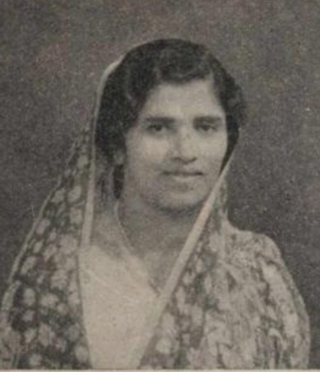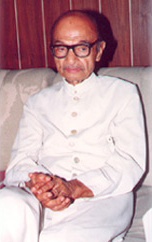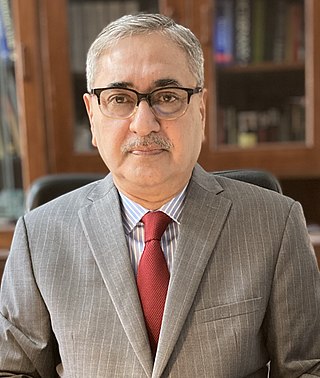
Pratibha Ray is an Indian academic and writer of Odia-language novels and stories. For her contribution to the Indian literature, Ray received the Jnanpith Award in 2011. She was awarded the Padma Bhushan in 2022.

John Matthai CIE (1886–1959) was an economist who served as Independent India's first Railway Minister and subsequently as well as India's Finance Minister, taking office shortly after the presentation of India's first Budget, in 1948. He was born on January 10, 1886, as the son of Challiyal Thomas Matthai and Anna Thayyil to an Anglican Syrian Christian family. He graduated in economics from the University of Madras. He served as a Professor and Head in University of Madras from 1922 to 1925. He presented two Budgets as India's Finance Minister, but resigned following the 1950 Budget in protest against the increasing power of the Planning Commission and P. C. Mahalanobis. He was the first Chairman of the State Bank of India when it was set up in 1955. He was the founding President of the Governing Body of the National Council of Applied Economic Research (NCAER) in New Delhi, India's first independent economic policy institute established in 1956. He served as the Vice Chancellor of the University of Mumbai from 1955 till 1957 and then as the first Vice Chancellor of the University of Kerala from 1957 to 1959. His nephew, Verghese Kurien, is generally recognized as the architect of India's White Revolution. Dr. John Matthai Centre, Thrissur, located on the large plot of land donated by his family, is named in his honour. His wife, Achamma Matthai was an Indian social worker and a women's rights activist. The Government of India honoured him in 1954 with the award of Padma Shri, the fourth highest Indian civilian award, for his contributions to the society,

Sir Chintaman Dwarakanath DeshmukhICS was an Indian civil servant and the first Indian to be appointed the Governor of the Reserve Bank of India in 1943 by the British Raj authorities. He subsequently served as the Finance Minister in the Union Cabinet (1950–1956). It was during this time that he also became a founding member of the Governing Body of NCAER, the National Council of Applied Economic Research in New Delhi, India's first independent economic policy institute established in 1956 at the behest of Prime Minister Jawaharlal Nehru. After resignation from Union Cabinet he worked as Chairman of UGC (1956–1961). He served as Vice-Chancellor of University of Delhi (1962–67). He was also President of Indian Statistical Institute from 1945 to 1964, Honorary Chairman of National Book Trust (1957–60).

Gunvant Shah is an essayist, educationist, columnist and philosophy writer and critic from Gujarat, India. He taught at various universities and participated in various education oriented events and organisations. His large number of essays, including philosophical essays, are published as books. He received Ranjitram Suvarna Chandrak in 1997 and Padma Shri, the fourth highest civilian award of India, in 2015. In 2019, he was awarded a D.Lit. by Gujarat University.

Dr. Vina Mazumdar was an Indian academic, left-wing activist and feminist. A pioneer in women's studies in India, she was a leading figure of the Indian women's movement. She was amongst the first women academics to combine activism with scholarly research in women's studies. She was secretary of the first Committee on the Status of Women in India that brought out the first report on the condition of women in the country, Towards Equality (1974). She was the founding Director of the Centre for Women's Development Studies (CWDS), an autonomous organisation established in 1980, under the Indian Council of Social Science Research (ICSSR). She was a National Research Professor at the Centre for Women's Development Studies, Delhi.
Vidyaben Shah was an Indian social worker and activist known for her work with children, women and the elderly in India. While she was already serving as Vice-President, she was appointed the first non-officio President of the New Delhi Municipal Council (NDMC) by Prime Minister Indira Gandhi in 1975. She has held several leading positions in the field of social welfare since the 1940s. Vidyaben Shah died at the age of 97 on 19 June 2020 at her residence in Delhi, her son Mihir Shah confirmed the news of Vidyaben Shah death.

Institute of Chemical Technology (ICT) is a public deemed university in Mumbai, India. The institute also has campuses at Bhubaneswar, Odisha and Jalna,. It is focused on training and research in the fields of chemical engineering, chemical technology, and pharmaceutical sciences. It was established in 1933 and was granted deemed university status in 2008, making it the only state-funded deemed university in India. On 12 February 2018 it was given the status of Category 1 institute with graded autonomy by the Ministry of Human Resource Development and the University Grants Commission (India). It is also an institute with a special status as mentioned in SECTION IV of the Report of the Empowered Expert Committee in 2018.
Motilal Wadhumal Jotwani was an Indian writer, educationist, gandhian and a former post doctoral fellow of Harvard Divinity School who specialized in Sindhi language and literature. A winner of Sahitya Academy Award, he was honoured by the Government of India in 2003 with Padma Shri, the fourth highest Indian civilian award.

Dr Hargovind Laxmishanker "H. L." Trivedi was an Indian nephrologist, immunologist, transplant surgeon and stem cell researcher.
Om Prakash Agrawal was an Indian Conservationist and the founder member of several organizations related to cultural heritage and conservation such as Indian National Trust for Art and Cultural Heritage (INTACH), Indian Council of Conservation Institute (ICCI) and the National Research Laboratory for the Conservation of Cultural Property (NRLC). He was the director general of INTACH Indian Conservation Institute and director general of ICCI and NRLC. The Government of India honoured him in 2011, with the award of Padma Shri, the fourth highest Indian civilian award for his contributions to the area of conservation.

Achamma Mathai was an Indian social worker, women's rights activist, a co-founder of Dr. John Mathai Centre, an institute of Information Technology, Economics, Management, Theatre Arts and Music under the University of Calicut and the wife of John Mathai, the first Railway Minister of India and a former Finance minister. During her stay in Delhi, when her husband was serving in the Union Ministry, she was reported to have been involved in activities related to children's education. During the riots that followed Indian independence, she worked alongside Sucheta Kripalani for the rehabilitation of the riot victims. She served as a member of the Advisory Committee for Libraries in 1955 and as the chairperson of the Central Social Welfare Board in the early Sixties. The Government of India honoured her in 1954, with the award of Padma Shri, the fourth highest Indian civilian award for her contributions to the society, placing her among the first recipients of the award.

Hakim Abdul Hameed was an Indian physician of the traditional medicine system of Unani, the founder chancellor of Jamia Hamdard, and a former chancellor of Aligarh Muslim University. His ancestors came from Kashgar to the Indian subcontinent, in the reign of the Mughal emperor, Shah Alam. He was the founder and chief trustee of Hamdard Laboratories. He was honoured by the Government of India in 1965, with the award of Padma Shri, the fourth highest Indian civilian award and in 1992, the government awarded him the third highest Indian honour of Padma Bhushan. He was the elder brother of the Hakeem Muhammad Saeed.
Indumati Chimanlal Sheth was an Indian independence activist, politician, social worker and educationist from Gujarat. Born in Ahmedabad and influenced by Mahatma Gandhi, she participated in the independence movement and later served as a deputy education minister of the Bombay State and education minister of Gujarat. She was awarded the Padma Shri in 1970 for her social work.
Chitra Jayant Naik (1918–2010) was an Indian educationist, writer, social worker, the chairperson of the Indian Institute of Education and the expert member of the Planning Commission of India. She was the chairperson of the Non-formal Education Committee set up by the Ministry of Human Resource Development and was a member of the National Literacy Mission. The Government of India awarded her the fourth highest Indian civilian honour of Padma Shri in 1986.

Meenakshi Gopinath is an Indian educationist, political scientist, writer and a former principal of Lady Shri Ram College, New Delhi. She is the founder and incumbent director of the Women in Security Conflict Management and Peace (WISCOMP), a non governmental organization promoting peace and socio-political leadership among the women of South Asia and a former member of the National Security Advisory Board, the first woman to serve the Government of India agency. She has served as a member of the selection panel of the Lokpal, a legal body which has jurisdiction over the legislators and government officials of India. The Government of India awarded her the fourth highest civilian honour of the Padma Shri, in 2007, for her contributions to Indian educational sector. She is a co-editor of the International Feminist Journal of Politics, the leading journal of feminist international relations and global politics.
Narmada Prasad Gupta is an Indian urologist, medical researcher, writer and the chairman of Academics and Research Division Urology at the Medanta, the Medicity, New Delhi. He is credited with over 10,000 urological surgical procedures and the highest number of urology robotics (URobotic) surgeries in India. He is a former head of the department of urology of the All India Institute of Medical Sciences Delhi and a former president of the Urological Society of India. He received the Dr. B. C. Roy Award, the highest Indian award in the medical category, from the Medical Council of India in 2005. The government of India awarded him the fourth highest civilian honour of the Padma Shri, in 2007, for his contributions to Indian medicine.
Mary Braganza, RCSJ, popularly known as Karuna Mary, is an Indian Catholic religious sister of the Society of the Sacred Heart, and former principal of Sophia College, Mumbai. Sr. Karuna Mary formerly led 204 colleges managed by the Society of the Sacred Heart. During her tenure at Sophia College, in 1970, the institution started Sophia Polytechnic. In 2008 the Government of India awarded her the fourth highest civilian honour, the Padma Shri for her social contributions.

Madhuri Barthwal née Uniyal is a folk singer of Uttarakhand, India. She is the first woman to be a music composer in All India Radio. She is said to be the first female musician from Uttarakhand to become a music teacher. On International Women's Day in 2019 she was awarded the Nari Shakti Puraskar by Ram Nath Kovind. She was awarded the Padma ShriIndia's fourth highest civilian award in 2022 by the Indian government in the field of art.

Raghuvendra Tanwar is an Indian professor and writer. In 2022, he has been awarded Padma Shri by the Indian Government for his contribution in literature and education.











